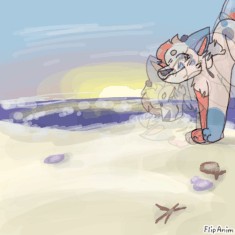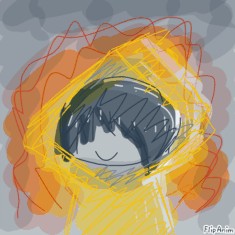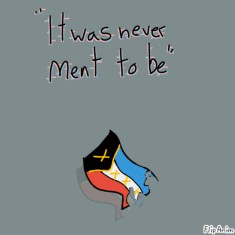
Untitled

Conch does,, stuff?

Untitled

TheBallTurnedItUpsideDown

ヾ( ~▽~)ツ ♪❤️~..-

Mob

Chasing the sun
wwyd lmt


73 comments


NightWolf20[OP]
17.05.2021 02:18
Linkyou where sleeping in your bed until you were awoken by a shatter of something falling and when your eyes adjusted to the darkness you saw a fairly young person?looked around the age of 15-16 floating a bit off the ground and seemed to have pushed a vase off its resting place
Comment removed

Okay:
In 1934, Charles B. Darrow of Germantown, Pennsylvania, presented a
game called MONOPOLY to the executives of Parker Brothers. Mr.
Darrow, like many other Americans, was unemployed at the time and
often played this game to amuse himself and pass the time. It was the
game’s exciting promise of fame and fortune that initially prompted
Darrow to produce this game on his own.
With help from a friend who was a printer, Darrow sold 5,000 sets
of the MONOPOLY game to a Philadelphia department store. As the
demand for the game grew, Darrow could not keep up with the orders
and arranged for Parker Brothers to take over the game.
Since 1935, when Parker Brothers acquired the rights to the game, it
has become the leading proprietary game not only in the United States
but throughout the Western World. As of 1994, the game is published
under license in 43 countries, and in 26 languages; in addition, the
U.S. Spanish edition is sold in another 11 countries.

OBJECT… The object of the game is to become the wealthiest player
through buying, renting and selling property.
EQUIPMENT… The equipment consists of a board, 2 dice, tokens, 32
houses and 12 hotels. There are Chance and Community Chest cards,
a Title Deed card for each property and play money.
PREPARATION… Place the board on a table and put the Chance and
Community Chest cards face down on their allotted spaces on the
board. Each player chooses one token to represent him/her while
traveling around the board.
Each player is given $1500 divided as follows: 2 each of $500’s,
$100’s and $50’s; 6 $20’s; 5 each of $10’s, $5’s and $1’s.
All remaining money and other equipment go to the Bank.
BANKER… Select as Banker a player who will also make a good

Auctioneer. A Banker who plays in the game must keep his/her
personal funds separate from those of the Bank. When more than five
persons play, the Banker may elect to act only as Banker and
Auctioneer.
THE BANK… Besides the Bank’s money, the Bank holds the Title Deed
cards and houses and hotels prior to purchase and use by the players.
The Bank pays salaries and bonuses. It sells and auctions properties
and hands out their proper Title Deed cards; it sells houses and hotels
to the players and loans money when required on mortgages.
The Bank collects all taxes, fines, loans and interest, and the price of
all properties which it sells and auctions.
The Bank never “goes broke.” If the Bank runs out of money, the
Banker may issue as much more as may be needed by writing on any
ordinary paper.

THE PLAY… Starting with the Banker, each player in turn throws the
dice. The player with the highest total starts the play: Place your token
on the corner marked “GO,” throw the dice and move your token in
the direction of the arrow the number of spaces indicated by the dice.
After you have completed your play, the turn passes to the left. The
tokens remain on the spaces occupied and proceed from that point on
the player’s next turn. Two or more tokens may rest on the same space
at the same time.
Comment removed

According to the space your token reaches, you may be entitled to
buy real estate or other properties — or obliged to pay rent, pay taxes,
draw a Chance or Community Chest card, “Go to Jail ® ,” etc.
If you throw doubles, you move your token as usual, the sum of the
two dice, and are subject to any privileges or penalties pertaining to
the space on which you land. Retaining the dice, throw again and
move your token as before. If you throw doubles three times in
succession, move your token immediately to the space marked “In
Jail”(see JAIL).
“GO”… Each time a player’s token lands on or passes over GO,
whether by throwing the dice or drawing a card, the Banker pays
him/her a $200 salary.

The $200 is paid only once each time around the board. However, if
a player passing GO on the throw of the dice lands 2 spaces beyond it
on Community Chest, or 7 spaces beyond it on Chance, and draws the
“Advance to GO” card, he/she collects $200 for passing GO the first
time and another $200 for reaching it the second time by instructions
on the card.
BUYING PROPERTY… Whenever you land on an unowned property
you may buy that property from the Bank at its printed price. You
receive the Title Deed card showing ownership; place it face up in
front of you.
If you do not wish to buy the property, the Banker sells it at auction
to the highest bidder. The buyer pays the Bank the amount of the bid
in cash and receives the Title Deed card for that property. Any player,
including the one who declined the option to buy it at the printed
price, may bid. Bidding may start at any price.

PAYING RENT… When you land on property owned by another
player, the owner collects rent from you in accordance with the list
printed on its Title Deed card.
If the property is mortgaged, no rent can be collected. When a
property is mortgaged, its Title Deed card is placed face down in front
of the owner.
It is an advantage to hold all the Title Deed cards in a color-group
(e.g., Boardwalk and Park Place; or Connecticut, Vermont and Oriental
Avenues) because the owner may then charge double rent for
unimproved properties in that color-group. This rule applies to
unmortgaged properties even if another property in that color-group
is mortgaged.
It is even more advantageous to have houses or hotels on properties
because rents are much higher than for unimproved properties.



